Not exactly a familiar group - yet as the north pole ice cap shrinks and summertime water appears, the possibilities of mineral and fossil fuel exploration in the arctic sea, as well commercial shipping in the short July-September season has catapulted this obscure group into red-hot geopolitical importance.
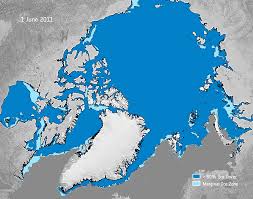 In this view of the Arctic Ocean, can anyone recognize any of the land masses and countries involved?
In this view of the Arctic Ocean, can anyone recognize any of the land masses and countries involved?
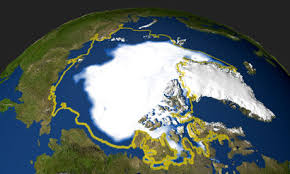 Perhaps this helps ... Alaska and Canada along the bottom, the large island Greenland to the right, so Russia is to the left ...
Perhaps this helps ... Alaska and Canada along the bottom, the large island Greenland to the right, so Russia is to the left ...
 The full Monty
What is the Arctic Council?
The full Monty
What is the Arctic Council?
According to the Encyclopaedia Britannica, the council is an "intergovernmental body that promotes research and facilitates cooperation among Arctic countries on issues related to the environmental protection and sustainable development of the Arctic region. The council was created in Ottawa in 1996 by the Declaration on the Establishment of the Arctic Council (the Ottawa Declaration). Member states of the council include Denmark, Canada, Norway, the United States, Russia, Sweden, Finland, and Iceland. The council also has a number of permanent participants drawn from groups that represent communities and peoples indigenous to the Arctic."
The council began its 8th meeting yesterday in Sweden (meeting biennially), marking the end of Sweden's chairmanship, and the beginning of Canada's (the US is slated for the next leadership role after Canada). Without delay, the Council plunged into controversies which emphasize the growing stakes and interest in the lands and waters it focuses on as a forum. From Germany's Deutsche Welle, we read, "Asian countries China, India, Japan,South Korea and Singapore have been granted permanent observer status on the Arctic Council, which coordinates research and development activities in the far North. Canada, Iceland, Norway, Russia, the USA and EU members Denmark, Finland and Sweden are currently members, while six indigenous groups are permanent participants. An application from the EU was blocked by Canada. Although numerous EU countries are already represented in the forum as members or observers, the EU is seeking permanent observer status for itself as a bloc."
Kiruna, Sweden, the location of this meeting is somewhat apropos or ironic depending on one's point of view, as it is adjacent to the world's largest iron ore mine, first operating over 100 years ago.
 The Kiruna mine in northern Sweden has some synchronicity with the Arctic Council's emergence of importance, as the Arctic Ocean is becoming more interesting for mining and drilling companies, not to mention governments that abut the body of water.
Click on image for full picture
The Kiruna mine in northern Sweden has some synchronicity with the Arctic Council's emergence of importance, as the Arctic Ocean is becoming more interesting for mining and drilling companies, not to mention governments that abut the body of water.
Click on image for full picture
 Teatree believes we're looking at Kiruna, a town of 23,000 at the other end of the gap in the previous picture. The town may actually be moved by the state owned mining company, Luossavaara-Kiirunavaara Aktiebolag (LKAB)to about a mile away, in order to provide the mining corporation better access to the vein of iron ore that apparently extends further into the town itself.
The EU blocked, and other reasons to be offended.
Teatree believes we're looking at Kiruna, a town of 23,000 at the other end of the gap in the previous picture. The town may actually be moved by the state owned mining company, Luossavaara-Kiirunavaara Aktiebolag (LKAB)to about a mile away, in order to provide the mining corporation better access to the vein of iron ore that apparently extends further into the town itself.
The EU blocked, and other reasons to be offended.
The EU, as mentioned, has been blocked from holding an observer seat at the Arctic Council - most maintain that Canada is behind the decision primarily because the EU in 2010 banned the sale of seal meat and fur in the trading block. That EU decision also "ruffled the feathers" of a variety of northern Canadian ethnic groups and other Arctic- bordering workers.
As the UK Independent notes, "Fur traders, including Inuit from Greenland and Canada and sporran makers in Scotland, are among those appealing against the 2010 EU ban in a European court. The legal battle is being led by the Fur Institute of Canada, which says that the ban has had an impact on the Canadian seal trade. Fishermen from several countries also allege that seals have become a menace, with growing populations reducing fish stocks. But environmental groups say fish stocks will not be boosted by a seal cull and that it is not possible to conduct one humanely. Campaigners also criticised Inuit groups for aligning themselves with commercial organisations.
Seals are hunted mainly for their skin, fat and meat, but there has also been a market for omega-3 capsules containing seal oil. In 2007, seal pelts sold for £60, but that has dropped to about £6. Concern is growing in Europe about the need to cull seal populations to protect fish stocks, even if seal products can no longer be used."
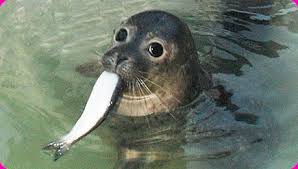 A conundrum - cute seals eat lots of fish. On whose side are you?
A conundrum - cute seals eat lots of fish. On whose side are you?
At the same time, and also with some irony, the new head of the Arctic Council is Canada's lone authentic northerner - Leona Aglukkaq, Canada's Health Minister, and Nunavut territory’s sole MP. As the Canadian Globe and Mail described it, Ms Aglukkaq "wasted no time as she took the helm at the ministerial meeting that marked the end of Sweden’s chairmanship." She declared "We must remember that the Arctic Council was formed by Northerners, for Northerners, long before the region was of interest to the rest of the world...” Ms. Aglukkaq makes no secret of the fact that that she regards the EU ban as an offensive bit of unfair interference by arrogant southerners in the lifestyle of her people, calling it a “huge, huge issue.”
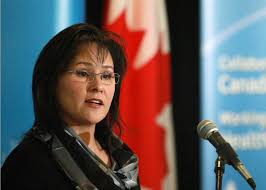 Leona Aglukkaq, Canada's Health Minister, Nunavut territory’s MP, and now the chair of the Arctic Council.
Leona Aglukkaq, Canada's Health Minister, Nunavut territory’s MP, and now the chair of the Arctic Council.
Ms. Aglukkaq also promised “big change” at the Arctic Council. Gone will be the focus on science for its own sake. Instead, research to develop the North for the benefit of northerners – such as her own Inuit and other indigenous peoples in Russia, Alaska and the Nordic countries – will take priority, she said. “It’s time to make sure science is relevant … to improve the well-being and the prosperity of people who live in the Arctic,” said the minister, who grew up in tiny, isolated Gjoa Haven. She announced a pan-Arctic business forum to be launched by Canada later this year as a major initiative to spur trade and development by sharing entrepreneurial successes among the nations ringing the Arctic."
 The small hamlet of Gjoa Haven where Ms Aglukkag grew up.
The small hamlet of Gjoa Haven where Ms Aglukkag grew up.
 Nunavut itself is the newest (1999), largest, and northernmost territory of Canada - about the size of Western Europe, but home to only 31,000 people.
Nunavut itself is the newest (1999), largest, and northernmost territory of Canada - about the size of Western Europe, but home to only 31,000 people.
The Globe and Mail article continues, "Greenpeace demonstrators, who hauled a fake, stuffed polar bear atop a mock oil spill to Parliament Hill, portray Ms. Aglukkaq as a pro-development pawn. The minister, who has the hide of a polar bear shot by her 11-year-old nephew hanging on her office wall, counters that some opponents just want to use their anti-whaling and anti-sealing campaign to raise money."
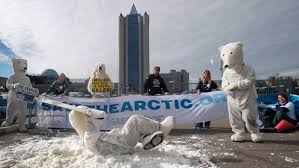 Wizards at imagery, Greenpeace protesters in Moscow last fall wearing polar bear costumes.
Wizards at imagery, Greenpeace protesters in Moscow last fall wearing polar bear costumes.
However, Inuit leaders in Canada rejected the [protest] as a “Greenpeace-orchestrated campaign” against resource development. “I know that the legitimate Inuit claims organizations and leaders across Canada’s Arctic regions do not share this view and we collectively reject Greenpeace’s questionable use of the Indigenous voice as a front for its own campaign,” Terry Audla, president of Inuit Tapiriit Kanatami, said in a release.
And so the fight is on, Greenpeace, EU voices of concern, pro-development forces that interestingly include significant indigenous peoples, all meeting at the city next to the largest iron ore mine in the world. It appears to Teatree that some development of resources in the Arctic, with a strong emphasis on strengthening the lives of indigenous peoples is a fair goal. Greenpeace, while legitimately challenging the risks of unthoughtful industrialization often seems to ignore the rather sterling examples of Norway and Sweden as they stand for environmental protection while developing resources for the betterment of their citizens.
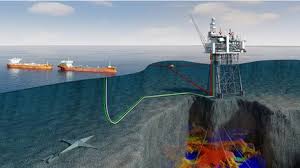 The North Sea between Norway and Scotland has brought great wealth and stability to Norway and its government in turn has strongly supported state of the art industry standards and protection as well as repeatedly putting itself in a position of leadership for environmental safeguards.
The North Sea between Norway and Scotland has brought great wealth and stability to Norway and its government in turn has strongly supported state of the art industry standards and protection as well as repeatedly putting itself in a position of leadership for environmental safeguards.
